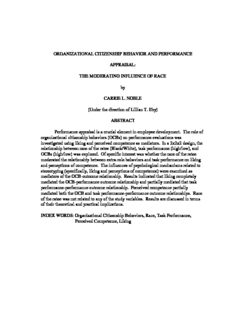
ORGANIZATIONAL CITIZENSHIP BEHAVIOR AND PERFORMANCE APPRAISAL: THE ... PDF
Preview ORGANIZATIONAL CITIZENSHIP BEHAVIOR AND PERFORMANCE APPRAISAL: THE ...
ORGANIZATIONAL CITIZENSHIP BEHAVIOR AND PERFORMANCE APPRAISAL: THE MODERATING INFLUENCE OF RACE by CARRIE L. NOBLE (Under the direction of Lillian T. Eby) ABSTRACT Performance appraisal is a crucial element in employee development. The role of organizational citizenship behaviors (OCBs) on performance evaluations was investigated using liking and perceived competence as mediators. In a 2x2x2 design, the relationship between race of the ratee (Black/White), task performance (high/low), and OCBs (high/low) was explored. Of specific interest was whether the race of the ratee moderated the relationship between extra-role behaviors and task performance on liking and perceptions of competence. The influences of psychological mechanisms related to stereotyping (specifically, liking and perceptions of competence) were examined as mediators of the OCB-outcome relationship. Results indicated that liking completely mediated the OCB-performance outcome relationship and partially mediated that task performance-performance outcome relationship. Perceived competence partially mediated both the OCB and task performance-performance outcome relationships. Race of the ratee was not related to any of the study variables. Results are discussed in terms of their theoretical and practical implications. INDEX WORDS: Organizational Citizenship Behaviors, Race, Task Performance, Perceived Competence, Liking ORGANIZATIONAL CITIZENSHIP BEHAVIOR AND PERFORMANCE APPRAISAL: THE MODERATING INFLUENCE OF RACE by CARRIE L NOBLE B.A. Agnes Scott College, 1993 A.B. University of Georgia, 1997 A Thesis Submitted to the Graduate Faculty of The University of Georgia in Partial Fulfillment of the Requirements for the Degree MASTER OF SCIENCE ATHENS, GEORGIA 2002 2002 Carrie L. Noble All Rights Reserved ORGANIZATIONAL CITIZENSHIP BEHAVIOR AND PERFORMANCE APPRAISAL: THE MODERATING INFLUENCE OF RACE by CARRIE L. NOBLE Approved: Major Professor: Lillian T. Eby Committee Garnett Stokes Kecia Thomas Electronic Version Approved: Gordhan L. Patel Dean of the Graduate School The University of Georgia May 2002 ACKNOWLEDGEMENTS Many people helped me accomplish this goal. First, thank you to Tammy Allen who kindly permitted me to use to her dissertation materials. Also, thank you to every person who participated in the making of the study materials. A special thanks to Douglas Johnson, Shane Douthitt, Sarah Douthitt, Keith Dooley, and Sarah Stanley Fallaw who gave their time and talent to assist in the creation of the research videos. I would like to express my appreciation for my friend, Tom Hancock, whose patience and generosity are without parallel and have helped sustain me through some difficult times. I owe a debt of gratitude to my mother, Carole Noble, that cannot be repaid; I could not ask for a better gift than her friendship, humor, and love. Thank you to my father, John Noble, whose honesty, character, and unwavering belief in my ability have been an inspiration. I would like to thank Garnett Stokes and Kecia Thomas for their time, effort and support. Last, but not least, a very special thank you to my advisor, Lillian Eby, whose exceptional insight, enthusiasm, kindness, and encouragement have invaluable. TABLE OF CONTENTS Page ACKNOWLEDGEMENTS...............................................................................................iv LIST OF TABLES............................................................................................................vii LIST OF FIGURES ........................................................................................................viii INTRODUCTION...............................................................................................................1 Social-Cognitive Processes........................................................................................5 Race............................................................................................................................8 Positive Affect.........................................................................................................10 Perceived Competence.............................................................................................11 OCB, Task Performance, and Race.........................................................................13 METHOD..........................................................................................................................19 Participants...............................................................................................................19 Design and Procedure..............................................................................................19 Materials..................................................................................................................21 Development of Stimulus Materials........................................................................23 RESULTS..........................................................................................................................27 DISCUSSION....................................................................................................................42 REFERENCES..................................................................................................................58 APPENDICES...................................................................................................................64 Appendix A..............................................................................................................65 Appendix B..............................................................................................................68 v Appendix C..............................................................................................................69 Appendix D..............................................................................................................70 vi LIST OF TABLES Table 1. Stereotype of various racial and ethnic groups....................................................16 Table 2. Correlation matrix of study variables..................................................................35 Table 3. Results of regression analysis for hypothesis 1 and 2.........................................36 Table 4. Results of regression analysis for hypothesis 5 and 6.........................................37 Table 5. Means for Measured Variables by Experimental Condition...............................38 Table 6. Means of Study Variable with Race....................................................................39 vii LIST OF FIGURES Figure 1. Conceptual model representing the hypothesized relationships of variables....15 Figure 2. Models representing hypothesized relationships between the process variable, liking, and OCBs, task performance, and outcome variables............................................17 Figure 3. Models representing the hypothesized relationships between the process variable, perceived competence, and OCBs, task performance, and the outcome variables.................................................................................................18 Figure 4. Interaction of OCB and task performance on the dependent variable, liking..................................................................................................40 Figure 5. Interaction of OCB and task performance on the dependent variable, perceived competence. ...................................................................................................................41 viii INTRODUCTION The effective functioning of an organization is a multifaceted construct. One component of organizational effectiveness is the valid, accurate, and appropriate use of performance appraisals. Performance appraisals are vitally important to both employees and organizations and serve a variety of functions in human resource management. For example, performance appraisal ratings are used to make decisions regarding promotions, merit increases and decreases, training, and transfer opportunities (Cascio, 1998). As such, performance appraisals have widespread influence on the career patterns of individuals. Consequently, the format, process, effects, and task related and non-task related components of performance appraisals have been extensively studied by industrial/organizational psychologists (Bretz, Milkovich, & Read, 1992; Cascio, 1998; Landy, 1989). Task performance has an obvious connection to performance appraisal ratings, promotion recommendations, and award allocations; task performance has a fundamental influence on overall performance evaluations. However, factors other than task performance influence performance appraisal ratings, promotion recommendations, and award allocations. For example, recent research suggests that discretionary behaviors or organizational citizenship behaviors (OCBs) are salient to raters and influence the appraisal process (Allen & Rush, 1998; MacKenzie, Podsakoff, & Fetter, 1991; MacKenzie, Podsakoff, & Fetter, 1993; Werner, 1994). In addition, raters’ preconceived notions (i.e., stereotypes) about certain groups can also influence performance judgments (Cascio, 1998; DeNisi, Cafferty, & Meglino; Feldman, 1981; Ilgen & Feldman, 1983;
Description: